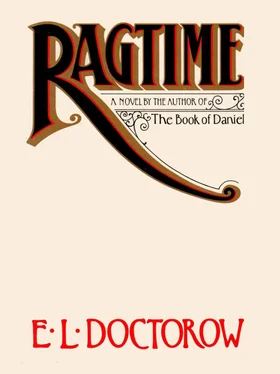Edgar Doctorow - Ragtime
Здесь есть возможность читать онлайн «Edgar Doctorow - Ragtime» весь текст электронной книги совершенно бесплатно (целиком полную версию без сокращений). В некоторых случаях можно слушать аудио, скачать через торрент в формате fb2 и присутствует краткое содержание. Жанр: Современная проза, на английском языке. Описание произведения, (предисловие) а так же отзывы посетителей доступны на портале библиотеки ЛибКат.
- Название:Ragtime
- Автор:
- Жанр:
- Год:неизвестен
- ISBN:нет данных
- Рейтинг книги:4 / 5. Голосов: 1
-
Избранное:Добавить в избранное
- Отзывы:
-
Ваша оценка:
- 80
- 1
- 2
- 3
- 4
- 5
Ragtime: краткое содержание, описание и аннотация
Предлагаем к чтению аннотацию, описание, краткое содержание или предисловие (зависит от того, что написал сам автор книги «Ragtime»). Если вы не нашли необходимую информацию о книге — напишите в комментариях, мы постараемся отыскать её.
Ragtime — читать онлайн бесплатно полную книгу (весь текст) целиком
Ниже представлен текст книги, разбитый по страницам. Система сохранения места последней прочитанной страницы, позволяет с удобством читать онлайн бесплатно книгу «Ragtime», без необходимости каждый раз заново искать на чём Вы остановились. Поставьте закладку, и сможете в любой момент перейти на страницу, на которой закончили чтение.
Интервал:
Закладка:
At the time of course not a few people on those sores were ready to agree with him. Millions of men were out of work. Those fortunate enough to have jobs were dared to form unions. Courts enjoined them, police busted their heads, their leaders were jailed and new men took their jobs. A union was an affront to God. The laboring man would be protected and cared for not by the labor agitators, said one wealthy man, but by the Christian men to whom God in His infinite wisdom had given the control of the property interests of this country. If all else failed the troops were called out. Armories rose in every city of the country. In the coal fields a miner made a dollar sixty a day if he could dig three tons. He lived in the company’s shacks and bought his food from the company stores. On the tobacco farms Negroes stripped tobacco leaves thirteen hours a day and earned six cents an hour, man, woman or child. Children suffered no discriminatory treatment. They did not complain as adults tended to do. Employers liked to think of them as happy elves. If there was a problem about employing children it had to do only with their endurance. They were more agile than adults but they tended in the latter hours of the day to lose a degree of efficiency. In the canneries and mills these were the hours they were most likely to lose their fingers or have their hands mangled or their legs crushed; they had to be counseled to stay alert. In the mines they worked as sorters of coal and sometimes were smothered in the coal chutes; they were warned to keep their wits about them. One hundred Negroes a year were lynched. One hundred miners were burned alive. One hundred children were mutilated. There seemed to be quotas for these things. There seemed to be quotas for death by starvation. There were oil trusts and banking trusts and railroad trusts and beef trusts and steel trusts. It became fashionable to honor the poor. At palaces in New York and Chicago people gave poverty balls. Guests came dressed in rags and ate from tin plates and drank from chipped mugs. Ballrooms were decorated to look like mines with beams, iron tracks and miner’s lamp. Theatrical scenery firms were hired to make outdoor gardens look like mines with beams, iron tracks and miner’s lamps. Theatrical scenery firms were hired to make outdoor garden look like dirt farms and ding rooms like cotton mills. Guests smoke cigar butts offered to them on silver trays. Minstrels performed in blackface. One hostess invited everyone to a stockyard ball. Guests were wrapped in long aprons and their heads covered with white caps. They dined and danced while hanging carcasses of bloody beef trailed around the walls on moving pulleys. Entrails spilled on the floor. The proceeds were for charity.
7
One day after a visit to the Tombs Evelyn Nesbit happened to notice through the rear window of the electric hansom that for the first time in days none of the reporters were following. Usually Hearst and Pulitzer reporters dogged her in packs.
On an impulse she told the driver to turn and go east. A servant of Harry Thaw’s mother, the driver permitted himself a frown. Evelyn took no notice. The car moved through the city, its motor humming in the warm afternoon. It was a black Detroit Electric with hard rubber tires. After a while through the window Evelyn saw the peddlers and pushcarts of the Lower East Side.
Dark-eyed faces peered into the hansom. Men with big moustaches smiled through their gold teeth. Street workers sat on the curbs in the heat and fanned themselves with their derbies. Boys in knickers ran alongside the car with bulky loads of piecework on their shoulders. Evelyn saw stores with Hebrew signs in the windows, the Hebrew letters looking to her eyes like arrangements of bones. She saw the iron fire escaped on the tenements as tiers of cellblocks. Nags in their yokes lifted their bowed necks to gaze at her. Ragmen struggling with their great junk-loaded two-wheeled carts, women selling breads from baskets carried in their arms: they all looked. The driver was nervous. He wore gray livery with black leather jodhpurs. A girl in a pinafore and high-laced shoes sat playing in the muck along the curbstone. A little dirty-faced girl. Stop the car, Evelyn said. The driver run around and opened her door. Evelyn stepped into the street. She knelt down. The girl has straight black hair that fitted her head like a helmet. She had olive skin and eyes so brown they were black. She gazed at Evelyn without curiosity. She was the most beautiful child Evelyn had ever seen. A piece of clothesline was tied around her wrist. Evelyn stood up, followed the clothesline, and found herself looking into the face of a mad old man with a closely cropped gray beard. The end of the line was tied around the old man’s waist. He wore a soft cap and a collar with a tie. He stood on the sidewalk in front of a display cart of framed silhouette portraits pinned to a black velvet curtain. He was a silhouette artist. With nothing but a small scissors and some glue he would make your image by cutting a piece of white paper and mounting it on a black background. The whole thing with the frame cost fifteen cents. Fifteen cents, lady, the old man said. Why do you have this child tied with a rope, Evelyn said. The old man gazed at her finery. He laughed and shook his head and talked to himself in Yiddish. He turned his back to her. A crowd had gathered when the car stopped. A tall workingman stepped forward and removed his hat with respect before translating for Evelyn what the old man had said. Please, missus, he said, so the little girl is not stolen from him. Evelyn had the feeling the translator was also something of a diplomat. The old artist was laughing bitterly and thrusting his chin in her direction, obviously commenting on her. He says the rich lady may not be aware that young girls in the slums are stolen every day from their parents and sold into slavery. Evelyn was shocked. This child can’t be more than ten, she said. The old man began to shout and pointed across the street at a tenement house, and turned and pointed toward the corner and turned and pointed to the other corner. Please, missus, the tall workingman said, married women, children, anyone they can get their hands on. They defile them and then in shame the female gives her life to vagrancy. Houses on this very street are used for this purpose. Where are the child’s parents, Evelyn demanded. The old man was now talking to the crowd, beating his breast and pointing his finger in the air. A woman in a black shawl shook her head and moaned in sympathy. The old man took off his hat and tugged at his hair. Even the tall workingman forgot to translate, so moved was he by the account. Please, missus, he finally said, this man himself is the child’s father. He pointed to the artist’s torn sleeve. His own wife, to feed them, offered herself and he has now driven her from his home and mourns her as we mourn the dead. His hair has turned white in the last month. He is thirty-two years old.
The old man, weeping and biting his lip, turned to Evelyn and saw now that she too was moved. For a moment everyone standing there on the corner shared his misfortune — Evelyn, the chauffeur, the workingman, the woman in the black shawl, the onlookers. Then one person walked away. Then another. The crowd dispersed. Evelyn made her way to the little girl still sitting at the curb. She knelt down, her eyes dewy, and looked into the face of the dry-eyed girl. Hey pumpkin, she said.
Thus began Evelyn Nesbit’s concern for the thirty-two-year-old geriatric artist and his daughter. The man had a long Jewish name that she couldn’t pronounce so she took to calling him Tateh, the name by which the little girl called him. Tateh was president of the Socialist Artists’ Alliance of the Lower East Side. He was a proud man. Evelyn discovered that there was no way to approach him except by coming to have her silhouette done. Over a period of two weeks the old man executed a hundred and forty silhouette portraits of Evelyn. After each one she would hand him fifteen cents. Sometimes she demanded a portrait of the little girl. Tateh executed over ninety of these, and he took more time with them. Then Evelyn asked for double portraits of herself and the little girl. At this the old man looked directly at her and a terrible Hebraic judgment seemed to flash from his eyes. Nevertheless he did as he was asked. As time went on it became apparent to Evelyn that while people sometimes stopped to watch the old man work, very few people asked to have their portraits done. He began to create more and more intricate silhouettes, full-figured, with backgrounds, of Evelyn, of the little girl, of a drayman’s horse plodding by, of five men in stiff collars sitting in an open car. With his scissors he suggested not merely outlines but textures, moods, character, despair. Most of these are today in private collections. Evelyn came nearly every afternoon and stayed for as long as she could. She dressed down to be as inconspicuous as possible. Following a Thaw practice she paid great sums of money to the chauffeur to keep him quiet. Gossip columnists began to interfere from Evelyn’s disappearances that she was engaging in reckless liaisons, and her name was linked with dozen of men around town. The less she was seen the more slanderous the reports became. She didn’t care. She sneaked off to her new love interest on the Lower East Side. She wore a shawl over her head and tattered black moth-eaten sweater over her shirtwaist; the chauffeur kept these for her under the car rug. She went to Tateh’s corner, stood for her portrait and feasted her eyes on the little girl at the end of the clothesline. She was infatuated. And all this time there was no man in her life other than her mad husband, Harry K. Thaw. Unless she wanted to consider her secret admirer, the young man with the high cheekbones and blond moustaches who followed her everywhere she went. She had seen him first at Tateh’ corner, standing across the street and turning his eyes away when she challenged him with her gaze. She knew her mother-in-law employed private detectives but she decided he was too shy to be a detective. He had learned where she lived and what her daily routine was, but he never approached her. She felt not intimidated by his attention but protected. Intuitively she felt his admiration like a keenness in her own breath. At night she dreamed of the little girl, woke up, thought of her. Plans for the future flashed in her mind like fireworks and quickly disappeared. She was anxious, overwrought, aroused, unaccountably happy. She would testify on her husband’s behalf and do it well. She was hopeful that he would be found guilty and locked up for life.
Читать дальшеИнтервал:
Закладка:
Похожие книги на «Ragtime»
Представляем Вашему вниманию похожие книги на «Ragtime» списком для выбора. Мы отобрали схожую по названию и смыслу литературу в надежде предоставить читателям больше вариантов отыскать новые, интересные, ещё непрочитанные произведения.
Обсуждение, отзывы о книге «Ragtime» и просто собственные мнения читателей. Оставьте ваши комментарии, напишите, что Вы думаете о произведении, его смысле или главных героях. Укажите что конкретно понравилось, а что нет, и почему Вы так считаете.












